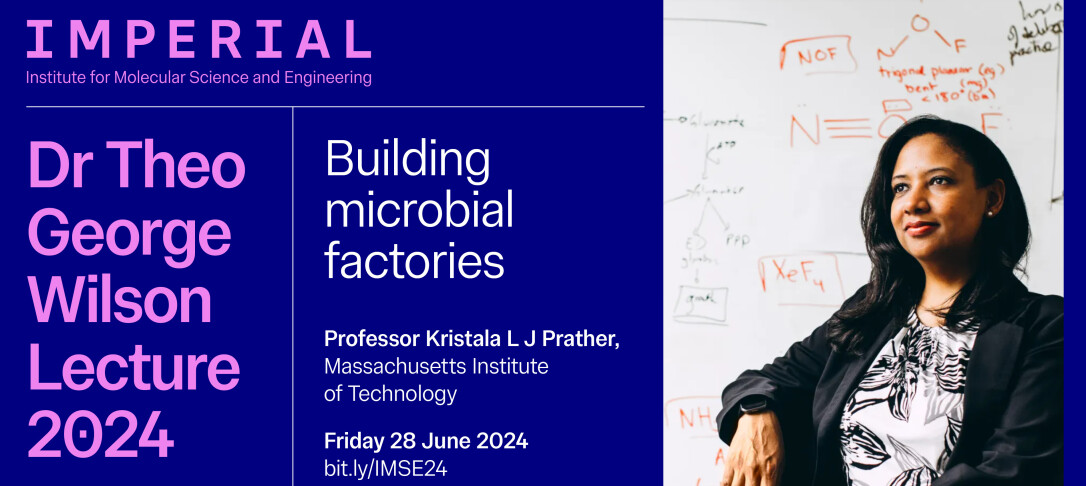
Register here
When and Where
The lecture will be held in City and Guilds Building Lecture Theatre 200, Imperial College London, South Kensington Campus on Friday 28 June 16.30-18.00. The lecture will also be accessible online through YouTube.
More Information
The Institute for Molecular Science and Engineering’s invites you to attend their sixth Dr Theo George Wilson Annual Lecture :
Building Microbial Chemical Factories: Design, Assembly, and Engineering of Biological Routes to Chemical Compounds
by Professor Kristala L. J. Prather (MIT)
Our Dr Theo George Wilson Lecture is the flagship event in our calendar of activities, with the aim of drawing together a diverse audience from across Imperial’s student and staff body as well as from our community of friends and stakeholders. Our objective with the Dr Theo George Wilson Lecture is to inspire and engage the IMSE community by increasing its awareness of wider challenges and activities. For those who can attend in person there will be a drinks reception after the lecture in the City and Guilds foyer just outside of the lecture theatre where you will be able to network with our speaker and other guests.
This lecture is open to all.
Abstract
Biological systems have the potential to produce a wide array of compounds with uses that include fuels, materials, bulk chemicals, and pharmaceuticals. Our group is focused on applying principles from metabolic engineering and biocatalysis towards the design and construction of novel biosynthetic pathways for specified target compounds. This “retro-biosynthetic design” approach is aided by advancements in the development of new tools under the umbrella of synthetic biology that facilitate re-engineering of biological systems. As new pathways are designed and constructed, typical challenges such as low product yields and titers can hamper development of commercially-relevant processes. The sheer volume of chemicals that ultimately need to be produced also requires the use of a broader range of feedstocks than those traditional employed in bioprocesses. In this talk, I will review our group’s sustained efforts to both produce novel compounds through biological synthesis and develop strategies to address the inherent limitations.
Biography
Kristala Jones Prather is the Arthur D. Little Professor of Chemical Engineering at MIT and an investigator in the multi-institutional Synthetic Biology Engineering Research Center (SynBERC) funded by the National Science Foundation (USA). She received an S.B. degree from MIT in 1994 and Ph.D. from the University of California, Berkeley (1999), and worked four years in BioProcess Research and Development at the Merck Research Labs (Rahway, NJ). Her research is focused on using novel bioprocesses to design recombinant microorganisms to produce small molecules. Prather is the recipient of a Camille and Henry Dreyfus Foundation New Faculty Award (2004), an Office of Naval Research Young Investigator Award (2005), a Technology Review “TR35” Young Innovator Award (2007), a National Science Foundation CAREER Award (2010), and the Biochemical Engineering Journal Young Investigator Award (2011). She has been recognized for excellence in teaching with the C. Michael Mohr Outstanding Faculty Award for Undergraduate Teaching in the Dept. of Chemical Engineering (2006), the MIT School of Engineering Junior Bose Award for Excellence in Teaching (2010), and through appointment as a MacVicar Faculty Fellow (2014), the highest honor given for undergraduate teaching at MIT. Prather has won numerous awards for her research, including the Andreas Acrivos Award for Professional Progress from the American Institute of Chemical Engineering in 2021. She was named a Fellow of the American Association for the Advancement of Science in 2018. In 2023, Prather was appointed head of MIT’s Department of Chemical Engineering.
Prather is known for her teaching, mentoring, and advocacy. In 2016, she was profiled on Spellbound, how kids become scientists. In 2015, Prather served on the advisory board of the Woodrow Wilson International Center for Scholars SynBio Project. She has been involved with several initiatives to support MIT students of color.
Professor Prather has co-authored more than 75 manuscripts and two book chapters, and has five issued patents with several additional applications pending.
Engineering Biology Symposium
The IMSE annual lecture will serve as the keynote speech for our Engineering Biology Symposium. This event will be held from 10.30-18.00 (including the annual lecture) on Friday 28 June in City and Guilds Building Lecture Theatre 200.
Discover the latest innovations at the intersection of biology and engineering through dynamic presentations and interactive sessions. Don’t miss this opportunity to connect with leading experts and peers in the field—register today and be part of shaping the future of engineering biology.
Please note that you do not need register for the annual lecture if you are attending the symposium.
About The Institute for Molecular Science and Engineering
The Institute for Molecular Science and Engineering (IMSE) is one of Imperial College London’s Global Institutes, drawing on the strength of its four faculties to address some of the grand challenges facing the world today. The Institute’s activities are focused on tackling problems where molecular innovation plays an important role.
If you have any questions about accessibility requirements please email l.adamson@imperial.ac.uk (Leah Adamson IMSE Events and Communications Manager)